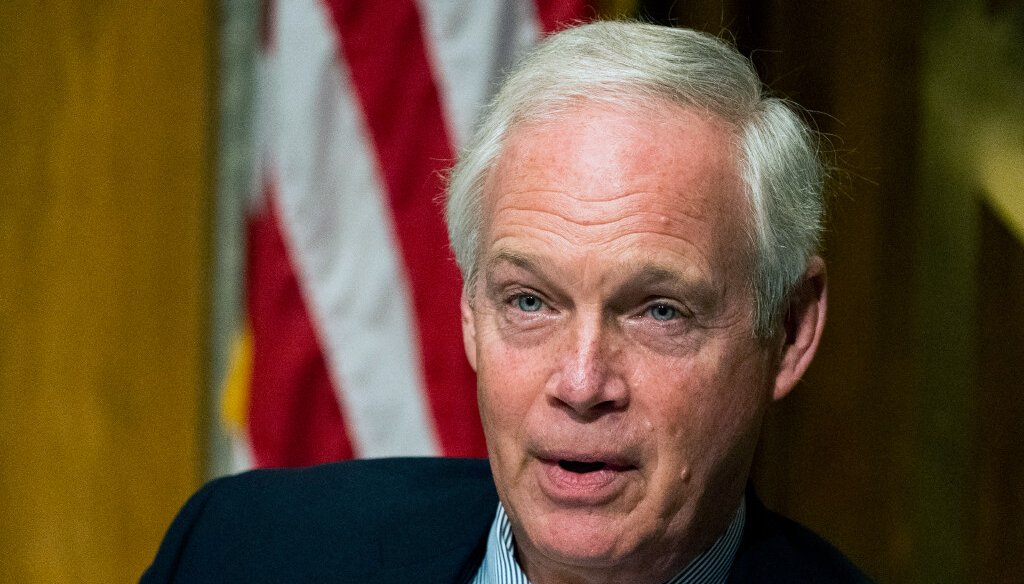



The passing of Justice Ruth Bader Ginsburg creates an unusual election-year vacancy on the U.S. Supreme Court.
And it generates a unique opportunity to examine the role of party politics in the process, since it’s basically a mirror-image of the 2016 situation.
In March 2016, Democratic President Barack Obama nominated Merrick Garland about eight months before the election following the death of conservative Justice Antonin Scalia. Now — a month and a half before a presidential election — we have a Republican president filling a spot created by the passing of a Democrat-appointed justice.
If President Donald Trump is successful in his stated desire to get a successor confirmed before his term expires, conservatives would hold a 6-3 majority on the high court.
The pending showdown between Republicans and Democrats in the U.S. Senate — which must approve any nomination — makes this a good opportunity to check in on Wisconsin’s Republican senator, Ron Johnson, has approached the two situations.
For that, we’ll break out our Flip-O-Meter, and our standard reminder: We’re not measuring whether any change in position is good policy or good politics. We’re just examining whether a public official has been consistent in his or her stated views.
PolitiFact National gave a Full Flop rating to Republican Senate Majority Leader Mitch McConnell and Democratic Minority Leader Sen. Chuck Schumer for switching their views on this topic since 2016.
Has Johnson also changed his tune with a different party in the White House?
The 2016 situation was notably different given the longer time before the election, but Johnson still said that the eight-month window four years ago was too close for an outgoing president to put forth a nominee.
"In the politicized atmosphere of an election year, you probably shouldn't even nominate someone," he told the Milwaukee Journal Sentinel in March 2016. "It's not fair to the nominee, it's not fair to the court."
In a news release two months later, he made a similar assertion.
"Let the American people have a voice in the composition of the Supreme Court," Johnson said in the May 2016 statement. "Instead of a lame duck president and Senate nominating and confirming, a new president and Senate – elected by the people only a few months from now – should make that important decision. I can’t think of a fairer or more democratic process."
In another May 2016 interview, he told reporters the government should let voters "decide the direction of the court through their votes."
Now, Johnson says "the Senate should vote" on Trump’s forthcoming nominee, despite the closeness of the election.
Defending that position, he said things are different now because the Senate and White House are both held by Republicans.
"We had divided government (in 2016). That’s a valid argument when you have divided government (saying) 'Let’s let the American people decide.' Right now, we don’t have divided government," he told the Journal Sentinel for a Sept. 19, 2020, story. "That makes all the difference in the world."
Asked to elaborate on how letting the voters decide wouldn’t apply in this situation, Johnson told the paper, "it's just the reality of the situation."
Johnson also noted on Twitter that John Roberts (23 days) and Sandra Day O’Connor (33 days) were confirmed in less time than the gap between now and the election — assuming Trump brings a nominee forth quickly. Among the 11 justices nominated since 1990, however, the average time to confirmation has been 66 days.
Johnson said in 2016 that an election-year Supreme Court vacancy should be delayed until after the election to "let the American people have a voice," calling it a "more democratic process."
But in 2020 — even though the election is six months closer — Johnson says the spot should be filled immediately. Of course, the president is now a Republican, whereas a Democrat brought forth the nomination in 2016.
Johnson is arguing his statements aren’t contradictory because now the Senate and president are both from the same party, which wasn’t true in 2016.
But Johnson offered no such qualifier in 2016. He simply said a nomination shouldn’t be made or confirmed in an election year. He’s attempting to retroactively make a distinction based on party control, but that only speaks to how likely a nomination is to be approved, not whether it’s proper to approve a nomination in an election year.
That means Johnson has completely reversed his position. We rate this a Full Flop.
Milwaukee Journal Sentinel, Johnson says he’s willing to meet with high court nominee, March 15, 2020
Ron Johnson website, Johnson Statement on Meeting with Judge Garland, May 10, 2016
Wisconsin Public Radio, In A Change From 2016 Stance, Ron Johnson Favors Vote On SCOTUS Nominee, Sept. 19, 2020
Milwaukee Journal Sentinel, Sen. Ron Johnson says GOP should confirm a new justice this year, despite his 2016 opposition to filling election-year vacancies, Sept. 19, 2020
Ron Johnson, tweet, Sept. 21, 2020
Ron Johnson, tweet, Sept. 21, 2020
U.S. Senate website, Supreme Court Nominations (1789-Present), accessed Sept. 22, 2020
In a world of wild talk and fake news, help us stand up for the facts.
